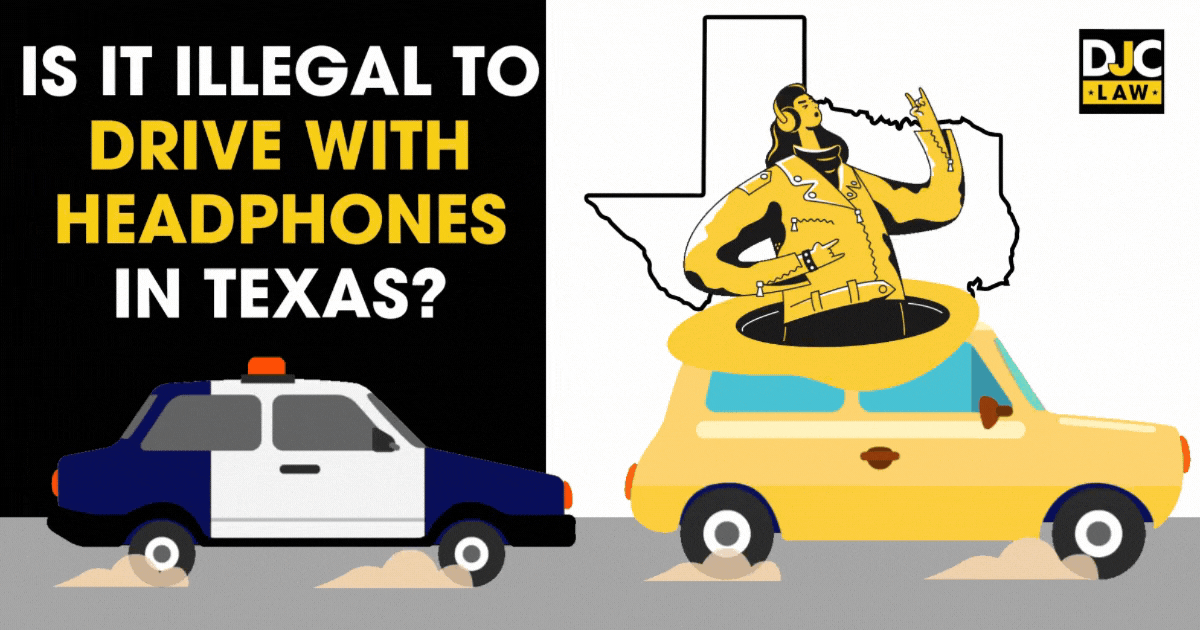
Is wearing headphones illegal? Texas does not prohibit the use of headphones or earbuds while driving. The caveat to this rule is that drivers must still remain vigilant for potential hazards. In some scenarios, wearing headphones while driving could result in a distracted driving citation.
In some scenarios, wearing headphones while driving could result in a distracted driving citation. If you’ve been involved in a crash in Austin caused by distracted driving, an Austin car accident lawyer can help you understand your legal rights and pursue compensation.
Distracted driving remains one of the biggest dangers in the U.S. According to the National Highway Traffic Safety Administration (NHTSA), 3,308 people were killed in collisions involving drivers who were distracted in 2022.
In today’s guide, we’ll discuss where you stand legally if you choose to drive with headphones and whether you should wear them.
Key Takeaways
Wearing headphones while driving in Texas is perfectly legal in any part of the state. However, if it’s believed that your headphone use is causing a distraction, you could be cited for distracted driving.
Distracted driving counts as any action that involves taking your attention away from the road. This includes visual, manual, auditory, and cognitive distractions.
Although not illegal, using headphones while driving could still result in a citation for distracted or dangerous driving, whether you were involved in an accident or not.
The consequences of wearing headphones could include an increased risk of an accident, fines, points on your license, and even criminal charges if you cause bodily injury or wrongful death.
Driving with headphones is inherently unsafe because it prevents you from hearing the auditory cues that could enable you to avoid an accident.
If you’re involved in an accident with a driver wearing headphones, you could have a case. Speak to an attorney about your crash to learn more about whether you could be entitled to compensation.
What is Distracted Driving?
Distracted driving is any activity that takes your attention away from the road and the act of driving. Several types of distracted driving exist, including visual, manual, auditory, and cognitive. Examples include using your cell phone, talking to passengers, or eating or drinking while driving.
Texas is a particular hotspot for distracted driving. According to the Texas Department of Transportation, nearly one in six crashes were caused by a distracted driver. Sadly, 399 people died, and 2,793 sustained at least one severe injury in these auto accidents.
So, what are the four types of distracted driving:
Visual – Any distraction that takes your eyes off the road. This could include texting while driving or turning your head to speak to someone in the passenger seat.
Manual – Any distraction that involves taking one or both hands off the wheel. It could include changing the radio station or reaching to take a swig of your drink.
Auditory – Any distraction that prevents you from hearing what’s happening around you. Wearing headphones or loud music could fall into this category.
Cognitive – Any distraction that takes your mind away from driving. For example, you might be tired or daydreaming.
No form of distracted driving is better than another. Driving distracted reduces your reaction times, with potentially catastrophic effects. For example, the Texas A&M Transportation Institute found that texting doubles a driver’s reaction time.
In an emergency, every second counts.
Can I Get a Traffic Citation If I Drive With Headphones On in Texas?
The law makes no mention of headphones or earbuds. You cannot be explicitly cited for wearing headphones, but you can be cited if a police officer believes you are driving distracted under Section 545.425 of the Texas Transportation Code.
Police officers may cite you for being a distracted driver if wearing headphones prevents you from hearing honking, emergency sirens, or other noises on the road. That doesn’t mean you cannot wear headphones or earbuds, but you must do so cautiously.
Texas law requires all drivers to exercise due caution and care to avoid accidents and keep other road users safe. With auditory signals being so vital for avoiding accidents, it’s down to the officer in question to decide whether your headphone use counts as distracted driving.
Using a Wireless Communication Device in Texas
Section 545.425 of the Texas Transportation Code refers to wireless communication devices, such as those used to read, write, or send electronic messages, images, or voice notes.
Since headphones are designed for listening to audio, they don’t qualify under this law. On the other hand, if you’re using your headphones with a device that could send and receive communications, like your cell phone, this could count as distracted driving.
Texas’ Hands-Free Law compels drivers to use hands-free devices, but that doesn’t allow drivers to skirt distracted driving laws. Admittedly, every situation is different, so whether or not you’re violating the law will depend on the exact circumstances.
How Common is Headphone Use While Driving?
Few statistics exist on how common headphone use is while driving. However, it’s estimated that thousands of people regularly drive with headphones or earbuds.
According to a ResearchGate study focusing specifically on medical undergraduates and their driving habits, approximately 37.3% of students said they used headphones while driving, and one in five said they used them every time they drove.
Are There Any Exceptions to the Law?
No exceptions exist to the laws on distracted driving. All drivers have the same duty of care to other road users and must take actions that ensure they are entirely focused on the road and what is going around them.
However, in terms of devices in your ears, there are a couple of exceptions to the rule:
Hearing-Impaired Users – Hearing-impaired users may use hearing aids to assist in driving. If you’re prescribed hearing aids by your doctor, you’re required to wear them while driving.
Emergencies – According to the Texas Department of Transportation, wearing headphones is acceptable as a communication device if you’re calling law enforcement or another emergency service. However, it’s recommended that you pull off to the side of the road or make the call while stopped at a red light.
However, road safety experts are united in recommending that you avoid wearing headphones or earbuds entirely.
Is it Illegal to Drive With Headphones in Other States?
Some states prohibit headphone and earbud use in some shape or form. No federal law applies to using audio devices while driving, so each state can make its own laws. In most states, there’s no ban on using headphones while driving.
It’s not as simple as you’re permitted to use headphones in one state but not in another, though. According to the Sacramento Bee, California Vehicle Code 27400 only prohibits covering both ears with earbuds or headphones. You can still wear a single earbud or cover only one ear with your headphones.
The states that currently have a headphone ban in place include:
California
Maryland
Minnesota
Louisiana
Virginia
Washington
In each of these states, a few exceptions exist for certain types of drivers. For example, emergency services personnel and other first responders can still use listening devices.
Regardless of the rules, distracted driving is a traffic violation in every state, and your headphone use could get you cited under these laws. Some professions, including commercial and school bus drivers, may even be subjected to dismissal.
Can I Use One Earbud While Driving in Texas?
Drivers may wear one earbud while driving in Texas because the Texas Transportation Code makes no mention of headphones or earbuds. If an officer believes you’re distracted, you can still be ticketed for wearing a single earbud.
More drivers than ever have resorted to wearing a single earbud or covering one ear with headphones to avoid compromising their safety nationwide. Several states have special laws and regulations on the practice of wearing one earbud.
Here’s a rundown of the patchwork of laws covering this issue:
One Earbud for Any Purpose – California, Colorado, Florida, Illinois, New York, Ohio, and Washington, DC, allow drivers to wear one earbud for any reason while driving.
One Earbud for Phone Calls – If you’re making a phone call using your earbuds or headphones, you can cover one ear in Pennsylvania, Georgia, and Rhode Island.
One Earbud for GPS or Improved Hearing – Alaska allows you to wear a single earbud for GPS purposes or to improve your hearing. In terms of the latter, all other states require you to have a prescription for anything in your ears.
One Earbud for GPS Only – You may only wear an earbud for GPS purposes if you’re in Massachusetts.
Over the years, we’ve noted that state laws on headphone and earbud use have evolved rapidly. Many drivers aren’t even aware of their state's distracted driving rules, with an AutoInsurance.com study finding that one in three drivers is unaware of their state’s rules on cell phone use.
Is Using Headphones While Driving Unsafe?
Wearing headphones while driving, regardless of legality, poses significant risks. Headphones and earbuds prevent you from hearing important noises that could prove critical to avoiding an accident.
It’s a proven fact that not being able to use all your senses increases your risk of being involved in a motor vehicle accident. Since it’s much harder to hear others while wearing headphones, your reaction times could be impeded. Moreover, if you’re involved in an accident, other drivers could use this to assign you part of the blame under Texas’s comparative negligence laws.
Wearing headphones is a distraction like any other, even if it isn’t illegal in the Lone Star State. According to the National Safety Council, 11.7% of fatal crashes across the country involved distractions from cell phone use.
As states become more aware of the dangers of distracted driving, headphone use could well come under the microscope in the years to come. Remember, you could be cited for dangerous driving if wearing headphones contributed to failing to yield or running a stop sign.
In short, wearing headphones is an unsafe driving activity, and just because it isn’t illegal doesn’t mean you should do it.
How Does Wearing Headphones Contribute to Accidents in Texas?
Wearing headphones can contribute to car accidents in Texas in a variety of ways, including isolating your hearing, impairing your communication, distracting you from the road, and causing panicked reactions.
Here are some examples of how these might play out:
Isolating Your Hearing – Whenever your ears are covered, you’re in a bubble. You might be unable to hear approaching emergency vehicles or someone honking about a hazard.
Impaired Communication – Taking auditory cues from others is crucial for road safety. For example, if someone is changing lanes and honking to let you know, you might miss it.
Distracted Driving – Wearing headphones may mean focusing on the music or a podcast instead of the actions of others around you.
Panic – If you’re wearing headphones and distracted, a car suddenly braking in front could startle you, causing you to crash into the back of them.
What are the Consequences of Driving with Headphones in Texas?
Driving with headphones in Texas comes with consequences that could result in serious legal penalties, including fines and even the loss of your license. These can hit you financially and even lead to jail time.
You could be ticketed $200 for dangerous or negligent driving and be required to make a court appearance, which comes with extra fees. If found guilty, you could see points on your driving record or even have your license suspended.
If you were wearing headphones and were involved in a crash, negligence could be assigned to you, preventing you from claiming financial compensation. Moreover, if you were at fault and the accident led to serious injuries or fatalities, you may even receive criminal charges, which could result in jail time.
What to Do if You Are in a Wreck With a Driver Wearing Headphones
Getting involved in an accident with a driver wearing headphones is traumatizing and may have resulted in you suffering losses. What matters is that you handle every accident with a cool head and prioritize your health and safety.
Follow these steps for what to do if you’re involved in an accident with a headphone-wearing driver:
Check Yourself – Check yourself and your passengers for any injuries. Call an ambulance if necessary.
Call the Police – Call 911 and ask for a traffic officer to attend and fill out an accident report.
Gather Evidence – Use your cell phone to snap pictures of any injuries, vehicular damage, and road conditions. You should also speak to eyewitnesses and ask them to leave their contact details.
Exchange Details – You’re required to exchange insurance details with the other driver by law. If you don’t do this, you could be charged with a hit-and-run.
Seek Medical Attention – Visit your nearest medical facility immediately for an examination. Many injuries don’t arise in the immediate aftermath because of the adrenaline coursing through your veins, including whiplash and concussion.
Inform Your Insurer – Practically every auto insurance provider requires you to report all accidents within 24-72 hours. Check your policy for the exact timeframe.
It’s also strongly recommended that you contact a car accident attorney as early as possible. Your personal injury lawyer will handle all insurance negotiations, gather evidence, and provide objective advice on your options.
What Damages Can I Recover for a Car Accident Claim?
Accident victims in Texas have the right to recover all economic and non-economic losses if they were involved in an accident that wasn’t their fault. These costs may include medical bills, lost wages, and property damage.
A talented auto accident lawyer can claim for various losses you might have sustained in an accident, including:
Medical costs
Lost wages
Lost earnings potential
Loss of enjoyment of life
Home/car modifications
Property damage
Knowing the value of your case is challenging because every accident is unique. What matters is that a personal injury attorney can evaluate your claim and provide a rough idea as to the dollar value of your case. Never accept the first settlement an insurer offers because the chances are it doesn’t represent the true extent of your losses.
What are the Benefits of Hiring a Car Accident Lawyer?
Car accident lawyers are skilled professionals capable of handling everything from your insurance company to other legal teams. They’ll determine whether you have a case, the value of said case, and how long you can expect to be in legal proceedings.
Here are seven reasons why hiring a car accident lawyer is beneficial for your case:
Deal With Your Insurer – Insurance companies aren’t your friends. It’s their job to minimize how much money they pay out. Your lawyer will ensure their tricks don’t work, and your losses are fully compensated.
Evaluate Your Case – Not all cases are entitled to compensation under Texas’s comparative negligence laws. Your lawyer will provide an objective view of your case and your chances of victory.
Proving Negligence – Your lawyer will prove the injuries you sustained using the evidence available. They’ll also prove that the other driver was to blame for your injuries.
Maximizing Compensation – How much is your claim worth? Your lawyer knows, and they’ll prove it. Remember, once you accept a settlement, there’s no going back, so your attorney ensures you never settle for less.
Tough Negotiators – Attorneys are there to take charge of negotiations and guarantee a fair settlement that adequately covers your losses. They’ll match the skills of experienced insurance negotiators and provide solid evidence to extract every dollar available.
Represent You in Court – If necessary, your attorney will file all the necessary papers and represent you before a judge. Experienced trial handlers are invaluable in avoiding lowball settlements because they’ll take your personal injury lawsuit all the way.
Prevent Damage to Your Case – Countless plaintiffs have damaged their cases through their own actions, such as agreeing to recorded statements or speculating on their cases. Attorneys are there to avoid putting you in a situation where your actions could reduce your damage award.
Wearing headphones while driving increases the risk of accidents. If you fall victim to one of these drivers, hire a Texas car accident attorney to fight your case on your behalf to ensure you get the settlement you deserve.
Texas Headphone Driving Laws FAQs
Can teenage drivers wear headphones while driving in Texas?
No, teenagers are explicitly prohibited from using any wireless communication device capable of sending or receiving communications. Headphones connected to a cell phone or similar device could fall under this rule.
Can you wear headphones while riding a motorcycle in Texas?
Yes, you can wear headphones or earbuds while riding a motorcycle in Texas. The same rules apply to car drivers as they do to bikers. However, it’s strongly recommended that you avoid wearing headphones to keep yourself safe.
Is it bad to wear noise-canceling headphones while driving?
Headphones distract you from the sounds that could alert you to an impending hazard. Noise-canceling headphones are even worse because they’re designed to block out all outside sounds. Like with standard headphones, it's not illegal to wear headphones, but it’s strongly recommended that you avoid wearing noise-canceling headphones behind the wheel.

